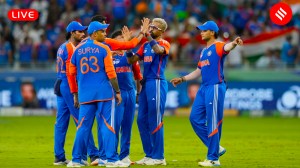Water, Musharraf and love
Water, Water every where, hey, don't you think it stinks?Water, Water every where, hey, why not watch it sink?You and Sam Coleridge, Samue...

Water, Water every where, hey, don’t you think it stinks?Water, Water every where, hey, why not watch it sink?
You and Sam Coleridge, Samuel Coleridge and you, may think this very poorpoetry, but it neatly sums up the level of discourse which flooded the mediaon Deepa Mehta’s film. The discussion has been critical in several ways: ithas revealed a deep and seemingly unbridgeable chasm between those for andagainst the film. It has resulted in an equation between freedom ofexpression and artistic merit: those who may have reservations about theaesthetic quality of Mehta’s work cannot voice those doubts withoutstrengthening opposition to the film per se the last thing they wish todo. The debate has been reduced to a minstrel show in black and white.
Events of the last two weeks and their expression in the media seem to havecrossed the danger mark: the law of the land is being pitted against the`sentiments’ of the people and we are exhorted to choose between them. Inthe process, views which had remained subterranean for so (too?) long, haverisen above sea level.
The Water level has steadily beenn rising. Controversy over Mehta’s earlierfilm, Fire, paintings by Hussain, a play about Nathuram Godse, nationalsongs, academic appointments, to name a few instances, have led to fiercedebates, violent protests. The media has been the site, the website inmodern parlance, for these conflicts. Each day a Deepa Mehta, a ShabanaAzmi, an Amol Palekar face-off against a Govindacharya, a B.P.Singhal an O.PRajagopal to air their opinions about each other’s work, minds and mannersviews which are often dismissive, subversive of civil or legal norms.
So: is the media providing space for legitimate and reasonable debate onsensitive, issues or is it allowing itself to be exploited for the aims andagendas of those who feel they profit by raising them? Not merely materialgain but cultural or political capital too? Does Mehta benefit from thiscurrent controversy because it gives her advance publicity of the kind shecould never otherwise have generated? Or will her opponents’ opinion that afilm can be stopped because it offends sensibilities, gain credibility?
Let’s ask ourselves: is the public interest served by the projection of anyand all opinions on the grounds that we learn what everyone is thinking?Does the media help create a more tolerant society by airing theseviewpoints, or does it legitimise the intolerable? More pertinently, doesmedia exposure continually raise the level of what is deemed acceptable? Itis said, if you repeat a lie often enough it becomes the truth. Modify this:if you repeat something often enough it becomes the new norm.
On television, in print on the Internet, people have repeatedly claimed thatMehta’s film is hurting people’s sensitivities; haven’t they made-believethat people’s sensibilities are actually offended even before the film hasbeen made?
If you want to, you could perhaps draw parallels between India and theHaider experiment, currently, in Austria: a politician with extreme viewsand Nazi sympathies has become acceptable. He’s joined the government.However, it might profit us more to look at Water and General Musharraf’sinterview on Doordarshan. The CEO of Pakistan Inc., granted Karan Thapar anaudience. Doordarshan granted him the opportunity to broadcast to ournation, instead of his. Which made for a change. Musharraf used the occasion(and every other question!) to blame the Vajpayee government for thecondition of Indo-Pak relations.
By remaining calm under a barrage of aggressive (some say insolent)questioning, he projected a calm, unruffled, realistic man who wanted totell it `like it is’. Listen India, he smiled gently, kindly into thecamera, there is only one issue between us. (Cricket?) Settle Kashmir andeverything else will settle itself. So simple, eh?
The chinks in his armour peeped through: his refusal to commit himself to atimetable for the return of democracy, his obdurate arrogance (“my word hasto be taken”), his admission on the Kargil tapes (“I agree with thosetapes”), his hesitant denial of Pakistani soldiers crossing the LOC duringKargil.
Nevertheless, while Thapar was all over the place, Musharraf remainedfocussed, still. Only under pressure, did he blink (rapidly). It’s not thatThapar did badly; it’s that Musharraf did better.
By his repitition of and insistence on the centrality of Kashmir to Indo-Pakrelations, Musharraf sorta had his way. By the end of the hour-long session,you were saying, “He’s right, it is all about Kashmir.” Repeat somethingenough it becomes the truth, acceptable.
Why did the government and Doordarshan give the `enemy’ 60 minutes in whichto attack this nation, project Pakistan, dictate the agenda? Well, if theyhadn’t, some private channel would have and word would have gone around thatthe government/DD didn’t have the courage (or gumption) to show it. Yes, butshould a national broadcaster give space to views which we think areoffensive, subversive and/or untruthful? Like Water, the jury’s out on thisone.
Water. Musharraf. Valentine’s Day. Don’t laugh. There’s a connection. Theremust have been love in the time before Valentine’s Day. But the media blastvia satellite TV in the last five years (and Archies’ which “says youcare”), by dint of effort and repitition has established 14 February as theone day you must, mast celebrate love. So the media does, we do. Celebrate.Some find it silly, others subversive of our culture. In Lucknow, there havereportedly been protests….
Photos



- 01
- 02
- 03
- 04
- 05




























